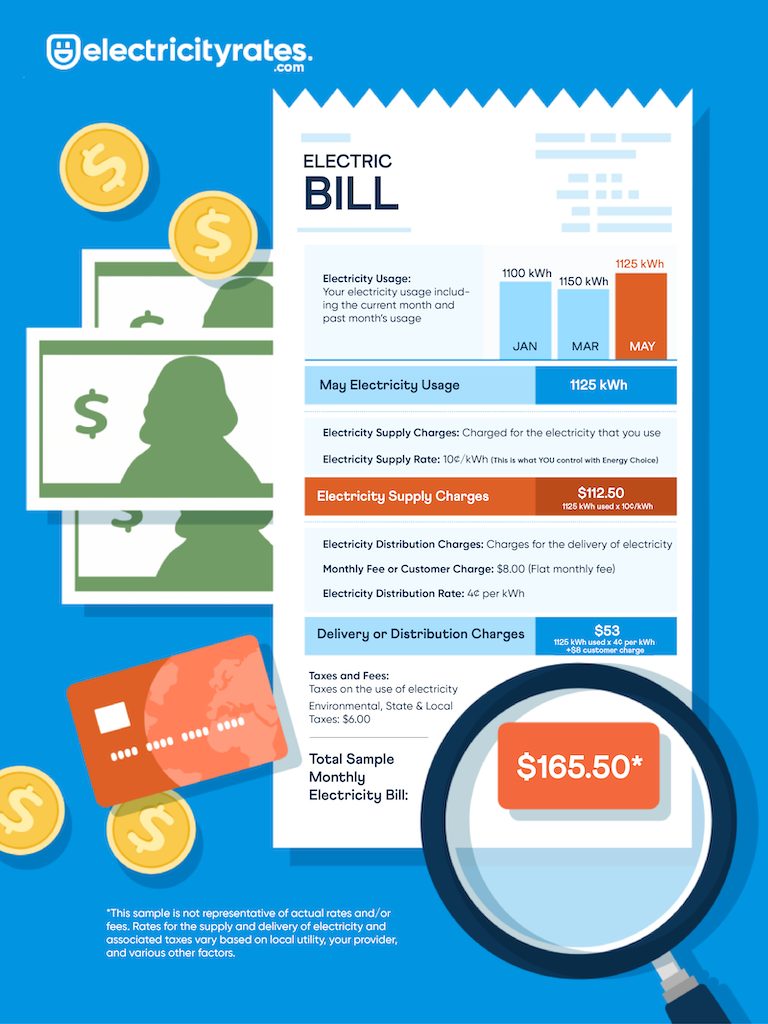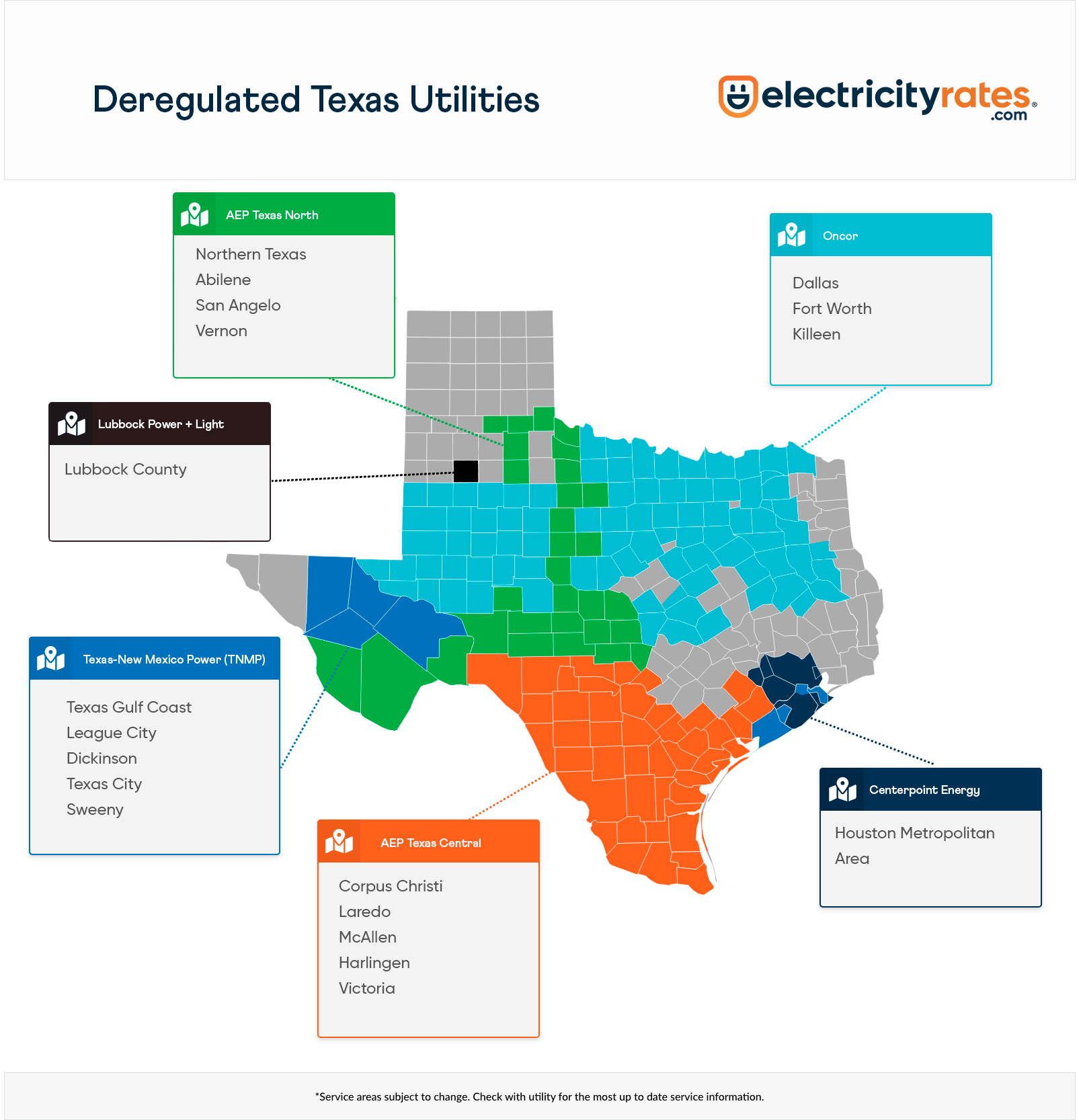The browser you are using is not supported. Please consider using a modern browser.

A Guide to Compare Texas Electricity Rates
Key Takeaways
- Understand the average cost of electricity in Texas and how the state compares to the rest of the U.S.
- Guide to types of Texas electricity plans so you have a core understanding of the details and fine print when shopping providers.
- Highlighting the best Texas electricity providers serving great rates, exceptional customer services and top-notch reputation.
- A history of how Texas became a deregulated energy market and how it has shaped the electricity market today.
Table of Contents

Shop Affordable Texas Electricity Rates

Why Switch Providers?
Average Texas Electricity Costs
As of November 2025, the average residential electricity price in Texas stands at 16.04 cents per kilowatt-hour, resulting in typical monthly bills of around $163.72 for an average consumption of 1,096 kWh. While these figures place Texas above the national average, they’re just a starting point. Your actual costs can vary significantly based on your usage patterns, chosen plan, and location within the state.
How Does Texas Compare Nationally?
-
16.04¢ Average Rate per/kWh as of November 2025 24th Highest Nationally
-
1,132 kWh Average Usage per/mo 6th Highest Nationally
-
$132.59 Average Cost per/mo 6th Highest Nationally
If you live in the Lone Star State, you have the power to choose your electricity provider—and that means you can compare electricity rates in Texas to find a plan that fits your needs and budget. Whether you’re a homeowner, renter, or business owner, ElectricityRates.com makes it easy to compare the best electricity plans in Texas and secure the lowest electricity rates in Texas available in your area.
What is “Power to Choose” Texas?
Power to Choose is the official website of the Public Utility Commission of Texas (PUCT) and was created to help Texans navigate the state’s deregulated electricity market. It serves as a resource for consumers to view and compare available electricity plans from different retail electricity providers.
However, with dozens of providers and a wide variety of plans—each with different rate structures, contract lengths, and fine print—the site can quickly become overwhelming and difficult to use.
That’s where ElectricityRates.com comes in. Our platform streamlines the process by enabling you to compare electricity rates in Texas easily, filter plans according to your needs, and select from only vetted, reputable energy providers. With a clean layout and transparent pricing, we make it easier to find the best electricity plans in Texas, eliminating confusion.
Energy Choice Program in Texas
Texas restructured its electricity market in 2002 as part of a broader effort to increase competition, drive innovation, and give consumers more control over their energy costs. Prior to deregulation, most Texans were limited to a single utility company that controlled both the delivery and supply of electricity, leaving little room for price competition or service variety. By opening the market to competition, the state aimed to lower electricity rates, improve customer service, and encourage investment in new energy technologies.
Today, residents in most parts of Texas can choose their electricity supplier, which means utility companies no longer have a monopoly on the supply portion of service. On top of that, the Electric Reliability Council of Texas (ERCOT) manages the grid and the wholesale electricity market to ensure it remains competitive. As a result, consumers can shop for the best electricity rates in Texas and select from a wide range of retail electricity providers and plan types that fit their household or business needs.
Understanding Your Texas Energy Bill
Your electricity bill in Texas is typically divided into two parts:
- Delivery charges: Set by your local utility company and non-negotiable.
- Supply charges: Based on your electricity usage and the rate set by your chosen energy supplier.
By switching suppliers, you can lower your supply rate and potentially reduce your overall bill.



Lowest Rates in the Lone Star State
Shop tailored electricity recommendations from leading providers for your home or business.
Texas Utility Companies
In Texas, utility companies—also known as Transmission and Distribution Service Providers—are responsible for delivering electricity, maintaining power lines, and responding to power outages. Several major Texas utility companies deliver electricity across the state, including:
Oncor is the largest electric utility in Texas, serving over 10 million customers across north and central Texas, including Dallas, Fort Worth, and their surrounding suburbs. The company maintains over 140,000 miles of power lines.
CenterPoint provides electric delivery service to the greater Houston area and parts of southeastern Texas. It serves over 2.5 million metered customers and has earned a reputation for storm recovery and grid resilience.
AEP Texas serves two distinct regions: AEP North covers areas such as Abilene, San Angelo, and Lubbock, while AEP Central includes Corpus Christi, McAllen, and the Rio Grande Valley. AEP operates as part of the larger American Electric Power system.
TNMP delivers electricity to more than 260,000 customers in west, north-central, and Gulf Coast Texas communities, including cities like Lewisville, Texas City, and Angleton. It’s a smaller utility with a focus on localized service and reliability.

Again, these companies are responsible for infrastructure (i.e., getting the electricity to your home or business)—not for setting your electricity rates. No matter which electricity supplier you choose, your utility remains the same based on your location.
What is an ESI ID Number?
An ESI ID (Electric Service Identifier) is a unique 17- or 22-digit number assigned to your electricity meter. It’s required to enroll in a new plan and is specific to your service address. You can usually find it on your electric bill or by using an ESI ID look-up Texas tool through your utility or electricity provider.
What to Look for When Selecting an Electricity Supplier
When comparing electricity plans in Texas, keep an eye out for:
- Rate type (fixed vs. variable): Fixed-rate plans lock in your rate for the entire contract, while variable-rate plans can fluctuate monthly based on market conditions.
- Contract length: Plans typically range from 3 to 36 months; consider how long you’re willing to commit and whether you’re planning to move during that period.
- Electricity Facts Label (EFL): The Electricity Facts Label is a document that gives you a breakdown of charges and terms for an electricity plan in Texas. It’s important to know how much electricity you consume each month. If you use more or less than that specific usage, you may end up with a significantly higher rate.
- Early termination fees: Some plans charge a fee if you cancel before your contract ends, so be sure to read the fine print before signing.
- Renewable energy options: Many providers offer green energy plans powered by wind or solar; look for options labeled “100% renewable” if sustainability matters to you.
- Reputation and customer reviews: Check ratings and customer feedback to avoid unreliable providers or hidden fees that could ultimately cost you more.
At ElectricityRates.com, we help you filter out the gimmicks so you can find the best electricity plans in Texas with transparent pricing and no hidden fees.
Types of Plans in TX
Texas electricity providers offer several plan types, including:
- Fixed-rate plans: Lock in a rate for the duration of your contract. These plans offer price stability and protection from market spikes, making them ideal for budgeting, especially if you plan to live in the same home for several years.
- Variable-rate plans: Rates change with the market each month. While they may offer low introductory rates, your bill can fluctuate significantly based on energy demand and wholesale prices.
- Time-of-use plans: Pay different rates depending on when you use electricity. You’ll save the most if you can shift high-energy activities—like laundry or dishwashing—to off-peak hours.
- Green energy plans: Power your home with 100% renewable energy. These plans support wind and solar production in Texas and are an excellent option for environmentally conscious consumers.
Business and Commercial Electricity Rates
If you own or operate a business in Texas, you can also benefit from the state’s deregulated energy market.
Businesses of all sizes—from small retail shops to large manufacturing plants—have the opportunity to compare electricity rates in Texas and select a plan that aligns with their budget, energy usage, and operating hours. ElectricityRates.com offers custom quotes and side-by-side plan comparisons to help you secure competitive commercial electricity rates in Texas.
In addition to cost savings, selecting the right electricity supplier can offer better customer service, flexible contract terms, and options for renewable energy plans that help meet your sustainability goals. Whether you’re launching a new venture or managing a multi-site operation, finding the right energy partner can have a positive impact on your bottom line.
Just Moved? Start New Electricity Service in Texas
If you’re new to Texas or moving within the state, you’ll want to choose a retail electricity provider before your move-in date. Use our electricity provider marketplace to compare Texas electricity rates by ZIP Code, find your ESI ID, and select a plan that’s ready when you are.
Best Texas Electricity Providers
Finding the right Texas electricity provider can be overwhelming. We have taken the research into our hands and brought you our Best Texas Electricity Providers based on product offering, energy innovation, and customer satisfaction. Below is the full list of providers that can be found in our electricity marketplace.
Constellation
- Provider Score™ 4.83 / 5
- Energy Options
- Service Areas CT, DC, GA, IL, MA, MD, NJ, NY, OH, PA, TX
Provider Bio
Constellation is the nation's leading provider of carbon-free energy with a commitment to be 100% carbon-free by 2040. They serve over 2.5 million residential and business customers across the United States.
TriEagle Energy
- Provider Score™ 4.29 / 5
- Energy Options
- Service Areas TX
Provider Bio
TriEagle Energy has been a well-respected leader in the Texas retail energy industry for to 20 years. Their focus is delivering value through energy cost savings, instilling trust by understanding the energy needs of its customers and providing customized solutions and products.
Rhythm
- Provider Score™ 4.49 / 5
- Energy Options
- Service Areas TX
Provider Bio
Rhythm is a Texas electricity provider that provides renewable energy plans sourced from Texas wind farms. The company prides itself on its selection of plans with straightforward pricing and no hidden fees or gimmicks.
Direct Energy
- Provider Score™ 4.59 / 5
- Energy Options
- Service Areas CT, DC, IL, MA, MD, NH, NJ, NY, OH, PA, TX
Provider Bio
Serving nearly 4 million residential customers, Direct Energy is one of the largest electricity, natural gas and home services providers in North America. They are also one of the largest commercial and industrial electricity with over 240,000 business electricity customers.
ElectricityRates.com TX Office
- Address: 4201 Main St Suite 200, Houston, TX 77002
- Phone: (832) 476-8721
Compare Electricity Rates in Popular Texas Cities
- Abilene
- Arlington
- Big Spring
- Corpus Christi
- Dallas
- El Paso
- Fort Worth
- Frisco
- Garland
- Houston
- Humble
- Irving
- Katy
- Killeen
- Laredo
- League City
- McAllen
- Mesquite
- North Richland Hills
- Paris
- Pearland
- Plano
- Richardson
- San Angelo
- Sugar Land
- Tyler
- Wichita Falls
- Lubbock
Texas Electricity Rates FAQs
-
Texas energy deregulation allows consumers to choose their electricity provider, promoting competition and potentially lower rates.
-
Enter your ZIP code on website to view and compare rates from different providers available in your area.
-
Fixed-rate, variable-rate, and renewable energy plans are available to suit various needs and preferences.
-
Compare plans, select the best one for you, and follow the provider’s sign-up process, often facilitated through our site.
-
Review your current rate, compare new offers, and decide whether to renew or switch providers based on the best available plan.


